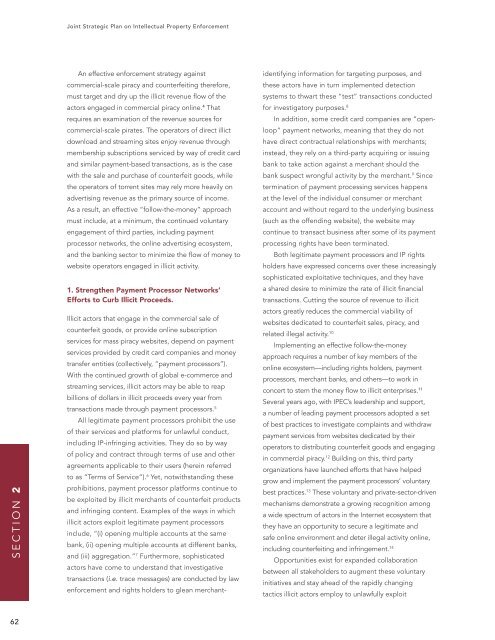ENFORCEMENT
eop_ipec_jointstrategicplan_hi-res
eop_ipec_jointstrategicplan_hi-res
Create successful ePaper yourself
Turn your PDF publications into a flip-book with our unique Google optimized e-Paper software.
Joint Strategic Plan on Intellectual Property Enforcement<br />
SECTION 2<br />
An effective enforcement strategy against<br />
commercial-scale piracy and counterfeiting therefore,<br />
must target and dry up the illicit revenue flow of the<br />
actors engaged in commercial piracy online. 4 That<br />
requires an examination of the revenue sources for<br />
commercial-scale pirates. The operators of direct illict<br />
download and streaming sites enjoy revenue through<br />
membership subscriptions serviced by way of credit card<br />
and similar payment-based transactions, as is the case<br />
with the sale and purchase of counterfeit goods, while<br />
the operators of torrent sites may rely more heavily on<br />
advertising revenue as the primary source of income.<br />
As a result, an effective “follow-the-money” approach<br />
must include, at a minimum, the continued voluntary<br />
engagement of third parties, including payment<br />
processor networks, the online advertising ecosystem,<br />
and the banking sector to minimize the flow of money to<br />
website operators engaged in illicit activity.<br />
1. Strengthen Payment Processor Networks’<br />
Efforts to Curb Illicit Proceeds.<br />
Illicit actors that engage in the commercial sale of<br />
counterfeit goods, or provide online subscription<br />
services for mass piracy websites, depend on payment<br />
services provided by credit card companies and money<br />
transfer entities (collectively, “payment processors”).<br />
With the continued growth of global e-commerce and<br />
streaming services, illicit actors may be able to reap<br />
billions of dollars in illicit proceeds every year from<br />
transactions made through payment processors. 5<br />
All legitimate payment processors prohibit the use<br />
of their services and platforms for unlawful conduct,<br />
including IP-infringing activities. They do so by way<br />
of policy and contract through terms of use and other<br />
agreements applicable to their users (herein referred<br />
to as “Terms of Service”). 6 Yet, notwithstanding these<br />
prohibitions, payment processor platforms continue to<br />
be exploited by illicit merchants of counterfeit products<br />
and infringing content. Examples of the ways in which<br />
illicit actors exploit legitimate payment processors<br />
include, “(i) opening multiple accounts at the same<br />
bank, (ii) opening multiple accounts at different banks,<br />
and (iii) aggregation.” 7 Furthermore, sophisticated<br />
actors have come to understand that investigative<br />
transactions (i.e. trace messages) are conducted by law<br />
enforcement and rights holders to glean merchantidentifying<br />
information for targeting purposes, and<br />
these actors have in turn implemented detection<br />
systems to thwart these “test” transactions conducted<br />
for investigatory purposes. 8<br />
In addition, some credit card companies are “openloop”<br />
payment networks, meaning that they do not<br />
have direct contractual relationships with merchants;<br />
instead, they rely on a third-party acquiring or issuing<br />
bank to take action against a merchant should the<br />
bank suspect wrongful activity by the merchant. 9 Since<br />
termination of payment processing services happens<br />
at the level of the individual consumer or merchant<br />
account and without regard to the underlying business<br />
(such as the offending website), the website may<br />
continue to transact business after some of its payment<br />
processing rights have been terminated.<br />
Both legitimate payment processors and IP rights<br />
holders have expressed concerns over these increasingly<br />
sophisticated exploitative techniques, and they have<br />
a shared desire to minimize the rate of illicit financial<br />
transactions. Cutting the source of revenue to illicit<br />
actors greatly reduces the commercial viability of<br />
websites dedicated to counterfeit sales, piracy, and<br />
related illegal activity. 10<br />
Implementing an effective follow-the-money<br />
approach requires a number of key members of the<br />
online ecosystem—including rights holders, payment<br />
processors, merchant banks, and others—to work in<br />
concert to stem the money flow to illicit enterprises. 11<br />
Several years ago, with IPEC’s leadership and support,<br />
a number of leading payment processors adopted a set<br />
of best practices to investigate complaints and withdraw<br />
payment services from websites dedicated by their<br />
operators to distributing counterfeit goods and engaging<br />
in commercial piracy. 12 Building on this, third party<br />
organizations have launched efforts that have helped<br />
grow and implement the payment processors’ voluntary<br />
best practices. 13 These voluntary and private-sector-driven<br />
mechanisms demonstrate a growing recognition among<br />
a wide spectrum of actors in the Internet ecosystem that<br />
they have an opportunity to secure a legitimate and<br />
safe online environment and deter illegal activity online,<br />
including counterfeiting and infringement. 14<br />
Opportunities exist for expanded collaboration<br />
between all stakeholders to augment these voluntary<br />
initiatives and stay ahead of the rapidly changing<br />
tactics illicit actors employ to unlawfully exploit<br />
62


